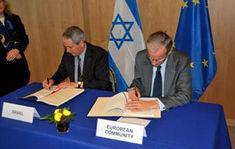
Israeli agricultural leaders have brokered a groundbreaking new deal with the EU that will see the majority of exports free from tax or levies.
An agricultural agreement signed in Brussels last week following lengthy negotiations will see around 80 per cent of fresh produce entirely exempt from customs restrictions.
More than 95 per cent of processed agricultural products will also be exempt from all taxes or levies following considerable liberalisation, as the two parties updated an agreement signed in the 1970s.
Since the original signing, the agreement has been updated several times in order to reflect the significant changes in the needs of both parties.
Israel's ambassador to the EU, Ran Curiel, signed the agreement for Israel, while Christian Danielsson, ambassador of Sweden, the current president of the EU, signed in the name of the Europeans.
Curiel, in praising the deal negotiated by Israel's ministry of agriculture and the ministry of industry, trade and labour, said the country’s agriculture was “today based on capital investment and technological innovation”.
The agricultural agreement constitutes one element in the wide range of existing agreements between Israel and the EU, which include the Israel-EU Association Agreement, the Israeli-EU Action Plan as part of the European Neighborhood Policy (ENP), the Euro-Mediterranean partnership, as well as Israel's participation in a score of European programmes and agencies, such as the Seventh Framework Programme for Research and Technological Development.
Approximately $1 billion (£596.4 million) of Israeli agricultural and processed food products are exported to the EU each year.
Europe is Israel's most important trading partner in the agricultural field, with more than 25 per cent of Israel's agricultural product and more than 75 per cent of its total fresh products exported to Europe.
The ministry of agriculture predicts that the new agreement will serve to expand agricultural exports significantly.
In a statement, the Israeli ministry for foreign affairs said: “Both Israel and the EU view the existence of active and modern rural areas as essential, as they are used to preserve open spaces and prevent rapid urbanisation processes.”



